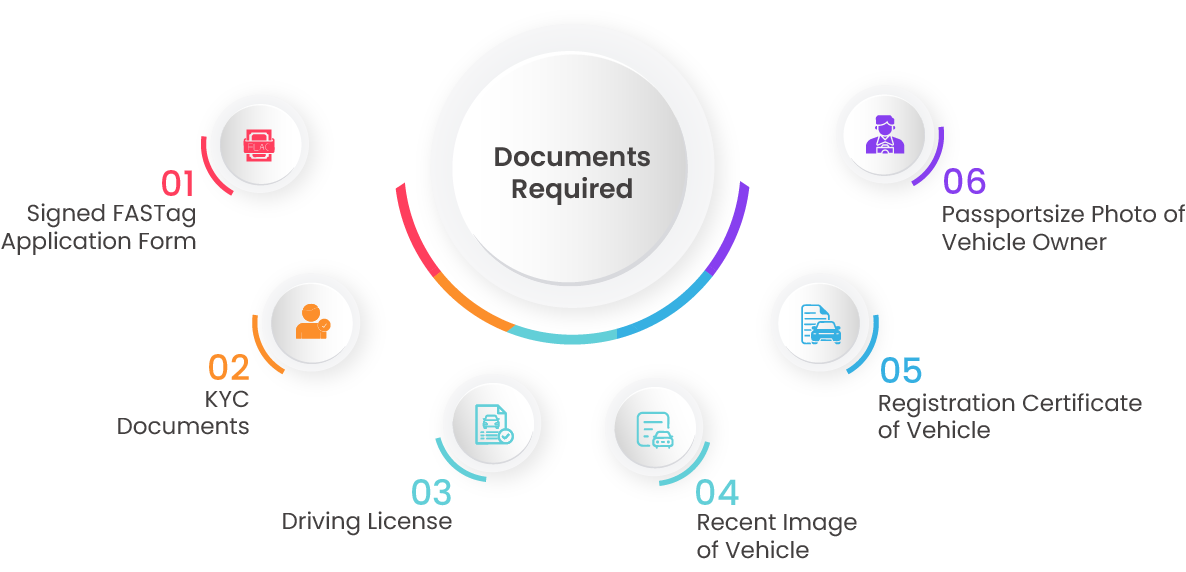Introduction
India’s highways are undergoing a major transformation with the introduction of FASTag, an innovative electronic toll collection system designed to streamline toll payments and alleviate congestion at toll plazas. FASTag is affixed to the vehicle’s windshield and utilizes Radio Frequency Identification (RFID) technology, enabling the automatic deduction of toll charges as vehicles pass through toll gates.
As a key component of the Digital India campaign, FASTag significantly reduces reliance on cash transactions and promotes digital payments, thereby enhancing the efficiency of road travel. By eliminating the need for cash payments, it saves both time and fuel, contributing to a more sustainable and convenient travel experience. Recent policies and circulars issued by the National Automated Clearing House (NACH) and other governing bodies emphasize the importance of the ‘One Vehicle, One FASTag’ initiative, ensuring a seamless and uniform process for all vehicle owners.
Benefits of FASTag
- Cashless Payments: FASTag eliminates the need for cash transactions at toll plazas, removing the inconvenience of collecting exact change.
- Cashback Offer: Users are eligible for a 5% monthly cashback on toll payments during FY 2018-19.
- Faster Transit: The auto-debit feature of FASTag ensures quicker and smoother passage through toll plazas, saving valuable time.
- Convenient Online Recharge: Recharge your FASTag easily through Credit Card, Debit Card, NEFT/RTGS, or Net Banking.
- Instant SMS Alerts: Receive immediate SMS notifications on your registered mobile number for toll payments, low balance, and other important updates.

FASTag offers unlimited validity, remaining functional as long as it is detectable by the scanner and remains undamaged. If the tag’s readability decreases due to wear and tear, customers can contact the issuing bank for a replacement. It can be easily purchased from authorized issuers and linked to a prepaid or savings account for automatic toll deductions. It can also be recharged as needed, ensuring a continuous and hassle-free travel experience.
Highlights of NACH Circulars
The National Automated Clearing House (NACH) has issued several circulars aimed at enhancing the FASTag system to ensure better compliance and efficiency. Below are the key highlights:
- One Vehicle, One FASTag: This initiative mandates the closure of multiple FASTags associated with the same vehicle by 15th April 2024. Only the most recently issued tag should remain active, except for tags listed on the Hotlist or Blacklist, which will be treated as exceptions.
- Mandatory Tag Closure: Issuers are required to complete the necessary changes and certification for the mandatory closure of older FASTags by 30th April 2024. This process will automatically close any older, multiple tags 15 calendar days after a new tag is registered.
- VAHAN Integration: The necessary changes and certifications for VAHAN integration must be completed by 30th April 2024. This will enable the issuance of FASTags linked to the VAHAN database, effective from 1st May 2024.
- New FASTag Design: The updated FASTag design will incorporate a UPI QR code, allowing users to easily scan and recharge their FASTag using any UPI-enabled app. Issuer banks must ensure that the new design is made available to customers starting from February 2024.
- PPBL Consumer Migration: Paytm Payments Bank Limited (PPBL) consumers must be seamlessly migrated under the ‘One Vehicle, One FASTag’ initiative, irrespective of their previous PPBL tag status.
- Facilitate FASTag Issuance for Hotlisted Vehicles: Issuers must implement the necessary changes to facilitate the issuance of FASTags for vehicles owned by PPBL consumers that are currently listed on the Hotlist.
- Maintain Adequate Inventory: Issuers must ensure an adequate and uninterrupted supply of FASTags at all toll plazas and other points of sale to meet the demand and ensure seamless service delivery.
- Staff Readiness: Issuers must ensure that all relevant channels, including on-ground staff and call centers, are sufficiently staffed and equipped to assist PPBL consumers who require FASTag replacements.
- Issuance Based on VIN: Issuers must issue FASTags based solely on the Vehicle Identification Number (VIN) from the dealer locations authorized by the Original Equipment Manufacturer (OEM).
- VRN Update Requirement: Issuers must update the Vehicle Registration Number (VRN) associated with each FASTag within 90 days of its issuance to ensure the accuracy of the vehicle data.
- Hotlisting for Non-Compliance: If the Vehicle Registration Number (VRN) is not updated within 90 days of FASTag issuance, the issuer is required to move the respective FASTag to the Hotlist, using exception code (01).
- Tag Closure for Continued Non-Compliance: If the VRN remains unupdated 30 days after the FASTag has been hotlisted, the issuer must close the tag using exception code (06) for non-compliance.
- E-Mandate Framework Announcement: The Reserve Bank of India (RBI) has introduced an e-mandate framework for the auto-replenishment of balances in NETC FASTag and RuPay NCMC. This is outlined in the “Statement on Developmental and Regulatory Policies” dated 7th June 2024.
- Auto-Replenishment: Issuers must ensure the facilitation of auto-replenishment when a customer’s balance falls below a threshold set by the customer:
- PDN Exemption: The 24-hour Pre-Debit Notification (PDN) requirement is exempted for auto-replenishment, as per the RBI circular issued on 22nd August 2024.
- Issuer banks must ensure that the PDN exemption for auto-replenishment applies exclusively to NETC FASTag and RuPay NCMC transactions.
- UPI remitter banks, payer PSP banks, and other relevant stakeholders must implement these directives promptly and communicate them to all concerned parties for immediate action.
FASTag has fundamentally transformed toll payments across India’s national highways, offering a seamless, cashless, and highly efficient solution for both drivers and toll operators. By leveraging advanced RFID technology, FASTag has significantly reduced wait times at toll plazas, streamlined digital transactions, and contributed to smoother traffic flow. With ongoing initiatives and policy developments from authorities such as NHAI, IHMCL, and NPCI, the system continues to evolve, focusing on enhancing compliance, convenience, and user satisfaction.
As India progresses toward a more integrated and digitally advanced infrastructure, FASTag stands as a compelling example of how innovation can enhance everyday life. Its successful implementation highlights the critical role of modern technologies in addressing traditional challenges, paving the way for a future where road travel is faster, safer, and more efficient for all.
Disclaimer
The information provided in this article is intended for general informational purposes only and should not be construed as legal advice. The content of this article is not intended to create and receipt of it does not constitute any relationship. Readers should not act upon this information without seeking professional legal counsel.


